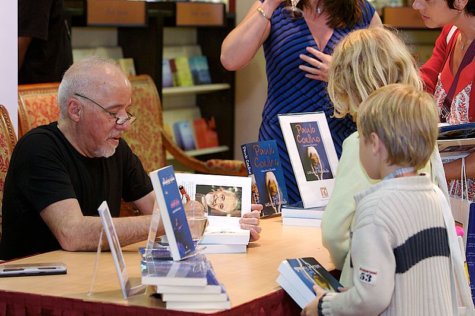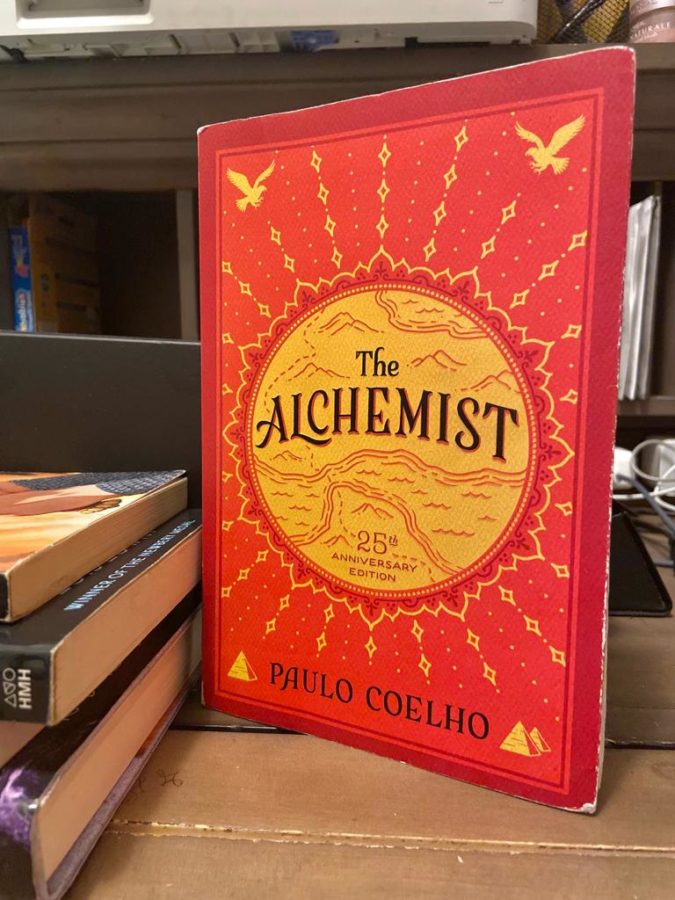Finding My Own Personal Legend in Paul Coelho’s ‘The Alchemist’
This novel isn’t just a fantasy tale. It’s a gateway for dreams to become reality.
The book that once was neglected by me during the hardships of the Covid-19 pandemic became one of my personal favorites of all time. Perhaps more personal legends will be discovered after giving this book a read.
“Remember that wherever your heart is, you will find your treasure.”
It’s a cool afternoon in November 2020, and I just finished my tiring virtual classes for the day. I close my laptop, its loud fan coming to a stop, and I immediately head to my bed to clock in for a much needed nap. Just then, I see my mother opening my door and walking inside with a book in her hand. Her eyes were brimming with stars as she said in our native tongue, “Maliha, you have to read this.”
She handed me the book, its orange cover titled The Alchemist in black lettering. It wasn’t thick like the textbooks I’m now used to reading, nor was it thin like the children’s books my mother typically read for her students. I flipped through the pages, surprised that it was in English. I voiced my surprise out loud and my mother nodded her head, understanding my confusion.
She told me she ordered a copy of the book in English for me so that I could read it for myself. She explained she came across the book from one of her coworkers and when she read the book translated in Bengali, she fell in love. “It’s translated into over eighty languages,” she exclaimed. “Can you believe that?”
“Interesting,” I muttered. “So what?”
“You haven’t been reading that much like you used to,” my mother scolded. “I believe this book will help you get back into it.”
I rolled my eyes, all too familiar with her nagging. I muttered how I’ll read it when I have the time, and set the book aside, grabbing my phone to scroll through social media. My mother turned around, shaking her head. “It’s a wonderful read,” she said again. “You have all this time. Make use of it.”
The book sat on my desk, collecting dust as days and weeks passed. Classes were flying by, my laptop was being slammed shut repeatedly, and I was collapsing on my bed and scrolling on my phone until my head started to hurt. Yet, my mother’s words kept repeating in the back of my mind, haunting me. Has my love for reading really started to fade away? Was it still there? The thought instantly made me depressed. How could I have let that happen?
I stared at the book, sitting silently. I felt guilty, and in a way, I could hear the pages, begging me to open and flip through them.
I picked up The Alchemist, and for the first time in a long time, I started to read.
—
“To realize one’s destiny is a person’s only obligation.”
Paul Coelho is a Brazilian lyricist and novelist, famous for his work The Alchemist. He was born in Rio de Janeiro on August 24th, 1947 with a Christian upbringing. He was rebellious and had a reluctant attitude toward Christianity. Coelho had an early desire to become a writer; however, his disapproving parents had sent him to a psychiatric hospital three times as a result of his ambitions and reluctance towards religion.
After Coelho was released, he went to law school but dropped out in the 1970s. Around this time, Brazil established a military dictatorship against the president at the time, João Goulart. The coup regime restricted freedom and political opposition, and reached its peak when João Figueiredo became president. Paulo wrote song lyrics for Brazilian musicians and was jailed numerous times for actively protesting against the country’s military rule and regulations. However, it was not until the 1980s where his life changed.
It was during this time where Coelho started to travel the world. His travels through Europe and Africa changed his perspective on life and motivated his desire to become a writer. Coelho walked more than 500 miles through Santiago de Compostela in Spain, a site of Catholic pilgrimage. The walk inspired him to write his first ever book, titled O diário de um mago, or The Pilgrimage, in 1987. Coelho had now devoted himself to writing completely.
The Alchemist was published in 1988 and it took Paul Coelho merely two weeks to complete it. “The Alchemist was already written in my soul, but I didn’t know it,” said Coelho on his Facebook account. A beautiful plot, an inspirational message, and a hope for readers — that is what The Alchemist was. Unfortunately, when it was released, it was not a hit.
The Alchemist sold only one copy during the week of its release. After a long month, it sold a second copy — but to the same person. Coelho’s original publisher saw no hope in the book and canceled the contract, leaving behind a heartbroken, 41 year old desperate writer.
“By the end of the year, it was clear to everyone that The Alchemist wasn’t working,” wrote Coelho in the book’s foreword. “But I never lost faith in the book or ever wavered in my vision. Why? Because it was me in there, all of me, heart, and soul.” It was his desire, his hopes, his personal legend, in the form of a book.
The story did not end there. Coelho started knocking from door to door in hopes of sharing his treasure to the world. He had succeeded; little by little, more copies of The Alchemist had started to sell throughout Brazilian bookstores. The novelist’s hard work had even brought attention to an American audience. An American visitor had helped Coelho translate his novel and share it onto American media platforms such as The New York Times and radio television shows. After influential individuals such as Madonna and Will Smith started to comment on the novel, the book boosted in popularity. The Alchemist had gained many achievements and became a bestseller and one of the top 20 books in the 20th century.
A book which had no potential 25 years earlier became a worldwide hit in just about a year. Translated into more than 80 languages, Coelho’s destiny had been shared.
—

“There is only one way to learn…It’s through action.”
The protagonist of the novel, Santiago, is a young shepherd in Andalusia who has been dreaming the same dream over and over again: a child transports him to the Egyptian pyramids, who says he will find treasure there. The dream troubles him, as he is not sure what to make of it. After he encounters a strange man who goes by the alias “The Old King of Salem,” he discovers, with his wisdom, that it is his personal destiny to travel all the way to Egyptian pyramids to gain the hidden treasure.
He follows through his destiny and along the way, encounters many people, goes through many experiences, good and bad, and sees many places. At the earliest stages of his journey, Santiago was scammed by a thief who took advantage of Santiago’s unfamiliarity with the new country and the Arabic language to steal all of his money. Disheartened, but not disparaged, Santiago continues on to make his way towards Egypt. He meets a friendly crystal merchant and with his help, gets a job and saves enough money to continue his journey.
Santiago’s outlook on the world grows with more and more traveling experience and he claims that he is learning the “language” of the world. He meets the famous Alchemist who offers to mentor him. His experiences helped him shape who he is by the end of the book and is an inspiration to those unsure with their life. Does Santiago ever reach his treasure?
Perhaps what intrigued me the most about the novel was the diversity of characters that appeared along Santiago’s journey. We read the story through Santiago’s perspective, his experiences, yet Coelho does not forget to include one major fact: everybody has a dream they wish to follow. It is truly fascinating and exciting to read about multiple other goals from other characters while we follow through Santiago’s own dream, which only emphasizes the theme of the novel even more.
The Alchemist was written as an adventure tale; there’s excitement, there’s plot, there’s fantasy. It attracts typical younger audiences who thrive off of adventure. But The Alchemist also has wisdom. It has relatable experiences. A huge part of why it is so beautiful is because it reveals a part of humanity and life. “An entrepreneurial tale of universal wisdom we can apply to the business of our own lives,” said Spencer Johnson, co-author of The One-Minute Manager.
There are many people in the world who are fearful of failure; they are terrified of life and unsure where they are meant to be in this world. The crystal merchant knows what his personal legend is, yet realizes his dream to visit Mecca was never going to happen. “It’s very difficult, Oprah, to accept that you know what you’re supposed to do when you are not doing it,” said Coelho in an interview with Oprah Winfrey. “Because from the moment that you know, you have to either leave a lot of things behind or live aware that you are not fully treasuring the miracle of being alive.”
It is terrifying, really. The thought of not being able to live life because of failure looms over all of us, and it’s very common now, especially through teenagers and young adults. But there is something I know now after reading The Alchemist. Realizing one’s dream is realizing one’s identity. Acting on that dream means becoming who you are meant to be.
I may not be a speaker, but I am a writer. And it is my personal legend to use my voice anyway I know how.
“Remember that wherever your heart is, you will find your treasure.”
– The Alchemist, in Paul Coelho’s The Alchemist (1988)
Maliha Chowdhury is an Editor-in-Chief and a Social Media Editor for ‘The Science Survey,’ and she enjoys the value of truth that is expressed in journalistic...











